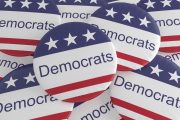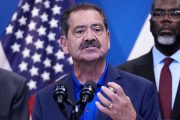Senate Judiciary Committee Chairman Chuck Grassley demanded late Thursday that Christine Blasey Ford’s attorneys turn over the evidence they claim to have that supports the psychologist’s accusation against U.S. Supreme Court nominee Brett Kavanaugh.
Grassley wrote the letter after the White House delivered the highly-anticipated FBI report on the allegations leveled against the federal judge after his confirmation became very likely.
Ford says Kavanaugh tried to rape her at a party in 1982, while Debbie Ramirez, a college classmate, claims he exposed himself to her. The FBI interviewed nine witnesses and did not find evidence to support the shaky accusations.
The demand from Grassley is his third.
The Letter
Ford’s attorneys, Michael Bromwich, and radical activist Debra Katz, who toils for an outfit funded by leftist subversive billionaire George Soros, had told Grassley they would not release evidence to the committee because the evidence was “private” and unnecessary to determine Ford’s credibility. The evidence includes notes from Ford’s therapy session, where she supposedly divulged Kavanaugh’s name.
After that, and a letter from Grassley on Tuesday, the attorneys said they would give the notes and other material to the FBI when it agreed to interview Ford. The FBI didn’t interview Ford for its report, which the White House delivered late Wednesday.
Thus, Grassley’s letter late Thursday.
“You said that Dr. Ford is willing to turn her documents over to the FBI, but my request of you was not for documents to be turned over to the FBI,” Grassley wrote. “I asked you to provide the documents to the Senate Judiciary Committee. Your response on behalf of your client is a non-sequitur. The Constitution charges the Senate with advising the President on his nomination. Senators have a constitutional obligation to investigate and evaluate independently the President’s nominees. Our obligation is unrelated to anything the FBI does.”
As well, Grassley wrote, “the U.S. Senate doesn’t control the FBI. If you have an objection to how the FBI conducts its investigations, take it up with Director Wray. But don’t raise that objection as a reason not to respond to this Committee’s demand for relevant evidence.”
Citing the committee’s obligation to probe Ford’s allegations, the FBI’s investigation regardless, Grassley wondered why the attorneys would give them to the FBI: “It’s not even clear to me what purpose turning over these materials to the FBI would accomplish. The FBI would simply turn over that evidence to the Senate. That is precisely the outcome I seek with this request.”
You have claimed repeatedly that the evidence I have requested supports Dr. Ford’s allegations against Judge Kavanaugh. She even provided some of this evidence to national news organizations. Accordingly, there is no reason for you to not produce the evidence to the Senate. Indeed, if the evidence supported your client’s allegations, you surely would produce it as quickly as you could.
But you have repeatedly refused to produce this evidence to the Senate…. I don’t know what other inference we should draw from your refusal but that the withheld evidence does not support Dr. Ford’s allegations in quite the way you have claimed.
Ford Friend Pressured?
The FBI report, Grassley said yesterday, contains “no hint of misconduct” on Kavanaugh’s part. Senator Jeff Flake (R-Ariz.), who collapsed under pressure from Democrats and requested the week-long probe of the accusations, said “we’ve seen no additional corroborating information.”
But it does contain a remarkable claim, the Wall Street Journal disclosed.
Leland Keyser, the good friend Ford said was at the party where Kavanaugh supposedly attacked Ford, but who did not remember any such event, told the FBI she was pressured to change her story. That pressure came from Monica McClean, a former FBI agent herself and another friend of Ford’s.
McClean denies twisting Keyser’s arm. “Absolutely false,” her attorney told the Journal.
Keyser, recall, is a key “witness” — except that she isn’t. Keyser said she didn’t remember any such party. Keyser’s attorney wrote that his client “does not know Mr. Kavanaugh and she has no recollection of ever being at a party or gathering where he was present.”
McClean’s role in the affair is also curious. According to an old boyfriend of Ford’s, the psychologist helped McClean prepare for a polygraph exam, which, if true, directly contradicted Ford’s testimony to the committee that she had never given advice about taking a polygraph. McClean also denied that story.
Photo: AP Images




